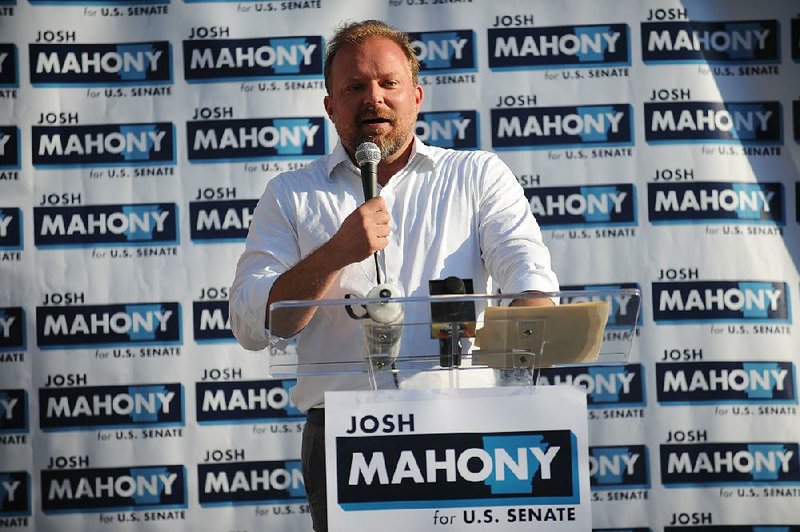The unspecified illness that forced Joshua Mahony to unexpectedly drop out of the U.S. Senate race this month involves a member of Mahony's immediate family, his attorney said Friday.
Mahony, who had been the lone Democrat running against incumbent Republican Sen. Tom Cotton, quit his candidacy Nov. 12, less than three hours after the filing deadline -- preventing another Democrat from filing to enter the race.
In a brief statement posted that day, Mahony cited a "family health concern" as the reason for his abrupt departure, but since then he has gone mostly quiet, deleting his social media pages and not responding to questions from reporters.
Meanwhile, the Democratic Party of Arkansas has been looking at legal options for replacing Mahony on the ballot, while the Republican Party of Arkansas has promised a lawsuit to stop any such effort, pointing to a state law that allows an unopposed candidate for nomination to be replaced only in the case of death or "serious illness."
Mark Henry, an attorney in Fayetteville, confirmed Friday that he had been retained by Mahony to offer clarity to the Democratic Party about the circumstances of Mahony's exit from the race.
"The family illness cited was not [to] himself," Henry said.
Henry said he was not authorized to say more about the illness or who had it -- other than that it was an "immediate" family member -- and that he could not say when Mahony first found out about the illness.
Mahony, 39, is married to Rhianon DeLeeuw, a vice president at Walmart Inc. The couple have no children.
Asked why an attorney was needed to provide such information to the Democratic Party, Henry said his services were to "bring a position of certainty and to end the discussion ... and to open communication in a more formal capacity, instead of allowing rumors to grow."
State Democratic Chairman Michael John Gray said he has not spoken directly with Mahony since the two had a short conversation shortly after Mahony posted his decision to exit the race on social media.
Last week, Henry sent a short letter to the Democratic Party of Arkansas, that clarified that Mahony was not ill.
Henry said he has not spoken with party leaders but is open to Mahony and him meeting with those leaders.
Mahony, Henry said, still supports Democrats' efforts in the 2020 elections.
"We have no problems sitting down," Henry said.
Asked how he would describe communications between party officials and Mahony's team, however, Gray said there had been "little or none."
"They have not responded to repeated requests for conversations," Gray said.
Under Arkansas Code 7-7-106, a political party may replace a candidate running unopposed in the primary in the case of death, or if the candidate informs the party that he cannot "accept the nomination due to a serious illness."
Since Mahony's withdrawal, GOP officials have made clear that they believe the law allows Mahony to be replaced only if he is the one who is sick. At a luncheon earlier this month attended by Gray and Republican Party of Arkansas Chairman Doyle Webb, Webb said that if Mahony claims he has withdrawn due to serious illness, "he'll have his opportunity to bring his doctor to court and testify."
In a statement Friday, state Republican spokesman Stephen Houserman said, "We are saddened to hear the news that Mr. Mahony's family is facing a serious illness, and we pray for their well-being."
Gray, meanwhile, said attorneys for the state Democratic Party are still reviewing the law and seeking facts.
If the party decides to go ahead with an attempt to replace Mahony, Gray said, there are candidates who have expressed interest in taking on Cotton, an incumbent with a sizable war chest.
While declining to offer names, Gray said there were Democratic candidates interested in entering the Senate race before the filing deadline, but ultimately they did not want to face a primary battle.
"I feel certain that had [Mahony] told us two hours before the deadline, instead of two hours after the deadline, we would have fielded a candidate on the ballot," Gray said.
The Republican and Democratic primaries are March 3. The general election is Nov. 3, when Cotton will face Ricky Dale Harrington Jr., a Libertarian, and potentially Dan Whitfield, an independent who must file petitions by May 1 to get on the ballot.
After the Democrat's decision to withdraw, Cotton's campaign touted its efforts to weaken Mahony's campaign.
Mahony, who entered the race in May, was subject to an opposition research effort that turned up "significant vulnerabilities" in the candidate's background, but Cotton's campaign ultimately decided to sit on the information until after the filing period, according to a memo obtained by the Arkansas Democrat-Gazette after Mahony's withdrawal.
Among the material uncovered by Cotton's campaign were inconsistencies between Mahony's work history that he listed on Federal Election Commission reports and public statements he made about not having a full-time job, according to the memo, which was sent to GOP supporters.
On the final day of filing, Republicans announced plans to file a complaint with the Federal Election Commission accusing Mahony of lying on his official paperwork, but the complaint wasn't filed after Mahony withdrew. (The problems in Mahony's reports were described in a Democrat-Gazette article in September.)
The memo from Cotton's campaign also details tax liens against Mahony that were discovered by Republican researchers.
Henry said he was not hired to handle any financial or criminal matters, and he has not received notice of any complaints from the FEC.
Information for this article was contributed by Frank E. Lockwood of the Arkansas Democrat-Gazette.
SundayMonday on 11/24/2019
